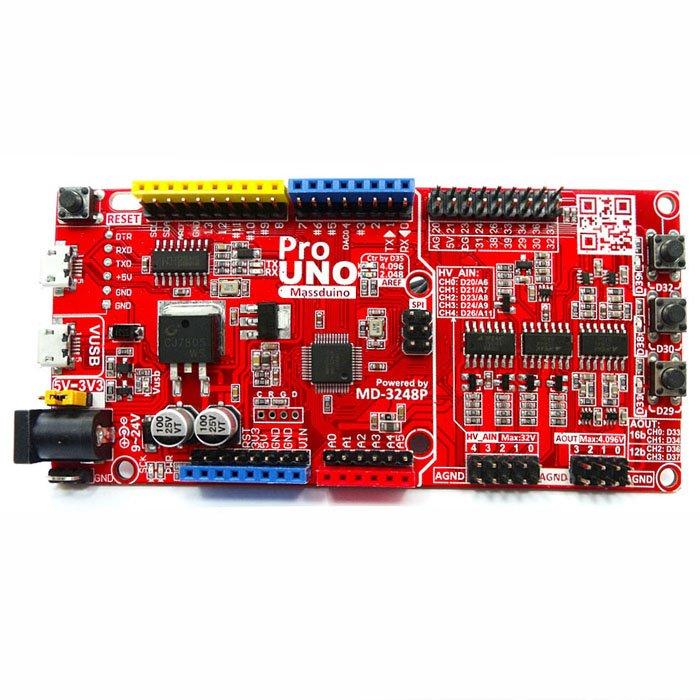In this article we look at the Arduino Uno, in my opinion still the best board to start with.
This hardware features an Onboard Virtual USB HID device which can be used to simulate a mouse or keyboard, similar to a Leonardo.
This is not an Atmel microcontroller – its an MD-3248P MCU with similar specs, there is a datasheet to pour over. Link at the bottom.
It is an Arduino Mega sized board with an Arduino Uno compatible section – you can fit a shield to it but it does not have the mega headers , this area of the board contains components for the ADC/DAC functionality and 3 switches. See the images on this page to see what I mean.
The I2C pins and the SPI pins do match although I have not tested whether Arduino shields work with this board so far or tested whether libraries for sensors or modules work either.

Features
I could not quickly find the usual information, the board is supposed to mirror the Arduino Uno exactly and the memory certainly confirms this but as for some of the other specs – these have been left blank for now.
| Microcontroller | MD-3248P MCU |
| Operating Voltage | 3.3V or 5V |
| Input Voltage (recommended) | DC 9 to 24V |
| Input Voltage (limit) | |
| Digital I/O Pins | 14 (of which 6 are PWM, Pins 3, 5, 6, 9, 10 and 11) |
| PWM Digital I/O Pins | 6 |
| Analog Input Pins | 6 |
| DC Current per I/O Pin | |
| DC Current for 3.3V Pin | |
| UART |
1 |
| SPI | 1 |
| I2C | 1 |
| Flash Memory | 32KB Flash |
| SRAM | 2KB SRAM |
| EEPROM | |
| Clock Speed | |
| LED_BUILTIN | 13 |
There is also the following functionality
3 user programmable LEDs
3 switches
4 CH pwm DAC (2 ch fast mode and 2 ch high resolution mode)
5 CH HV ADC (Max input 32V)
Onboard 4.096V and 2.048V voltage reference source
DAC :
- UNO Pro have 4ch onboard PWM DAC , they are connection to D33/D34/D36/D37 , when you config those pin for PWM function, the onboard LPF will convert the PWM signal to a analog voltage , the analog level is depended on the duty cycle of the PWM signal.
- The reference source of the DAC is connect to onboard 4.096V reference, which means the max output of DAC is 4.096V.
- The D33/D34 are using TIM3 and D36/D37 using TIM1 , so the PWM DAC0 (D33) and PWM DAC1 (D34) must have same resolution and PWM2 and PWM3 are too.
- The DAC resolution is depended on the PWM resolution , if the PWM resolution set to 12bit , the DAC resolution is 12bit too , the max level is 2^12 = 4096 levels.
- For PWM signal, the resolution is inversely proportional with the frequency , which means if you using higher resolution , you must lower the frequency. So if you set PWM resolution to 16bit , the frequency will be 16times lower than 12bit.
- The LPF (Low Pass Filter) will lead the analog signal delay, the 16bit PWM signal will lead 16 times delay time than 12bit. In UNO Pro , the 12bit PWM delay time is 5mS and 16bit PWM delay is 80mS.
- So that’s why we setup two type of DACs , CH0/1 is high resolution but with lower sample rate , CH2/3 is higher sample rate but resolution is lower than DAC0/1.
Here is a pinout of the board
Installation
The board works with the Arduino IDE
In order to use Massduino UNO Pro , you need to download massduino support package from below link:
https://github.com/dimag0g/massduino_boards or http://www.inhaos.com/downcount.php?download_id=218
Find the directory that suits your Arduino IDE version , copy to target directory . Here is the default sketchbook directory for most a few operating systems
> Windows: C:\Users\<Username>\Documents\Arduino
> Mac OSX: /Users/user/Documents/Arduino
> LINUX: /home/<Username>/sketchbook
And then restart the Arduino IDE , you will see the device appear in the menu :
Tools – > board – > Massduino Ev board -> MD-3248P-LQFT48
Cost
Couldn’t find on Amazon
| Site | Link | Price |
| Amazon.com | ||
| Aliexpress | Massduino UNO Pro R3 | $15.99 |
| Amazon.co.uk |
Summary
A bit of a niche board but if you need some ADC/DAC functionality then this may do the trick, not too expensive.
Not a lot of resources online if you encounter any issues with existing Arduino libraries
Links
| (MassDuino) CH341 USB to Serial Driver |
| SCH-UNO-Pro-V03C-20180823 |
| DOC-UNOPro-V01-20180531 |
| UM-MASSDUINO-V4.6r2-EN |
| Arduino – Massduino_Support_Package_V51 |
| MD-3248P 8bit MCU datash |
